Migration and Attachments Article 2022
This paper examines the role of public spaces in developing emotions of place attachment by first generation migrants.
24 Pages6574 Words10 Views
Added on 2022-10-15
Migration and Attachments Article 2022
This paper examines the role of public spaces in developing emotions of place attachment by first generation migrants.
Added on 2022-10-15
ShareRelated Documents
Running head: MIGRATION AND ATTACHMENTS
Migration and attachments
Name of the Student
Name of the University
Author Note
Migration and attachments
Name of the Student
Name of the University
Author Note
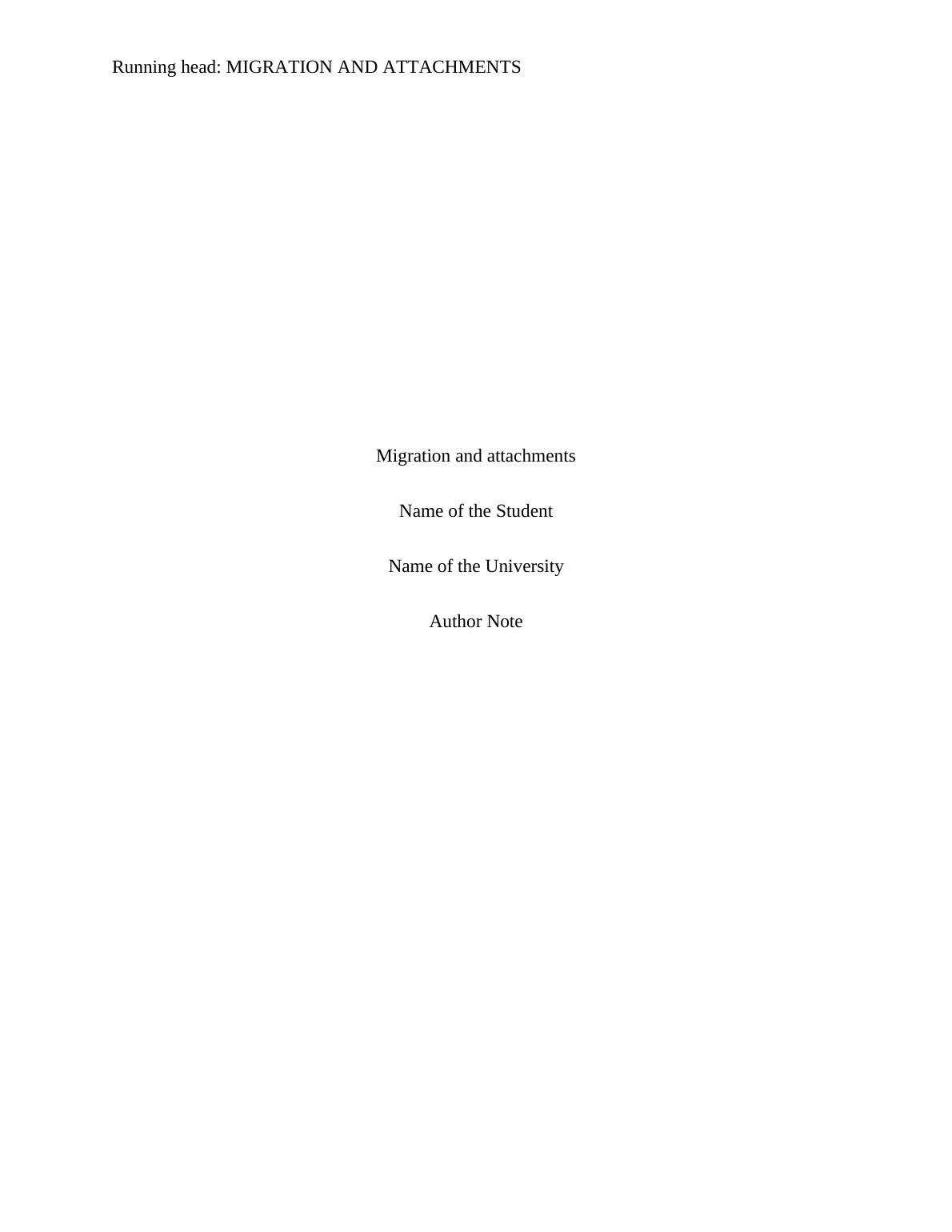
MIGRATION AND ATTACHMENTS
1
Summary of Article 1
Temple, B., 2010. Feeling special: Language in the lives of Polish people. The Sociological
Review, 58(2), pp.286-304.
Introduction
The article “Feeling Special: Language in the Lives of Polish People” deals with the idea
that how language helps in self-assertion and helps one to define their identity and individuality.
The author in this article has researched upon the Polish people, who find speaking Polish as one
of the most important criteria of defining their identity. According to the people of Poland, if
they change their language and speak in a different language other than Polish, the manner in
which they present themselves to the outside world would be a matter of concern. Change in
one’s language means change in the values and the ways in which they are perceived in the
public, and in the manner they relate to other people.
Literature Review
According to the author, every language has a cohesive power. For instance the English
language has the capability to keep the communities connected and the proficiency of the
language also helps in the integration. Learning the language of English can help one to
understand the way the British people lead their life. The examination of the expertise in English
language that the migrants have to appear for achieving the citizenship of the nation, in UK,
helps in the community cohesion as well as mingling well with the native s of the place. Britain
is indeed rich with community diversity and there are a large number of people, belonging to
different nations, live in the city. The English language here plays an important role in binding
these people by defining one single culture and by being a mirror that reflects the culture of the
1
Summary of Article 1
Temple, B., 2010. Feeling special: Language in the lives of Polish people. The Sociological
Review, 58(2), pp.286-304.
Introduction
The article “Feeling Special: Language in the Lives of Polish People” deals with the idea
that how language helps in self-assertion and helps one to define their identity and individuality.
The author in this article has researched upon the Polish people, who find speaking Polish as one
of the most important criteria of defining their identity. According to the people of Poland, if
they change their language and speak in a different language other than Polish, the manner in
which they present themselves to the outside world would be a matter of concern. Change in
one’s language means change in the values and the ways in which they are perceived in the
public, and in the manner they relate to other people.
Literature Review
According to the author, every language has a cohesive power. For instance the English
language has the capability to keep the communities connected and the proficiency of the
language also helps in the integration. Learning the language of English can help one to
understand the way the British people lead their life. The examination of the expertise in English
language that the migrants have to appear for achieving the citizenship of the nation, in UK,
helps in the community cohesion as well as mingling well with the native s of the place. Britain
is indeed rich with community diversity and there are a large number of people, belonging to
different nations, live in the city. The English language here plays an important role in binding
these people by defining one single culture and by being a mirror that reflects the culture of the
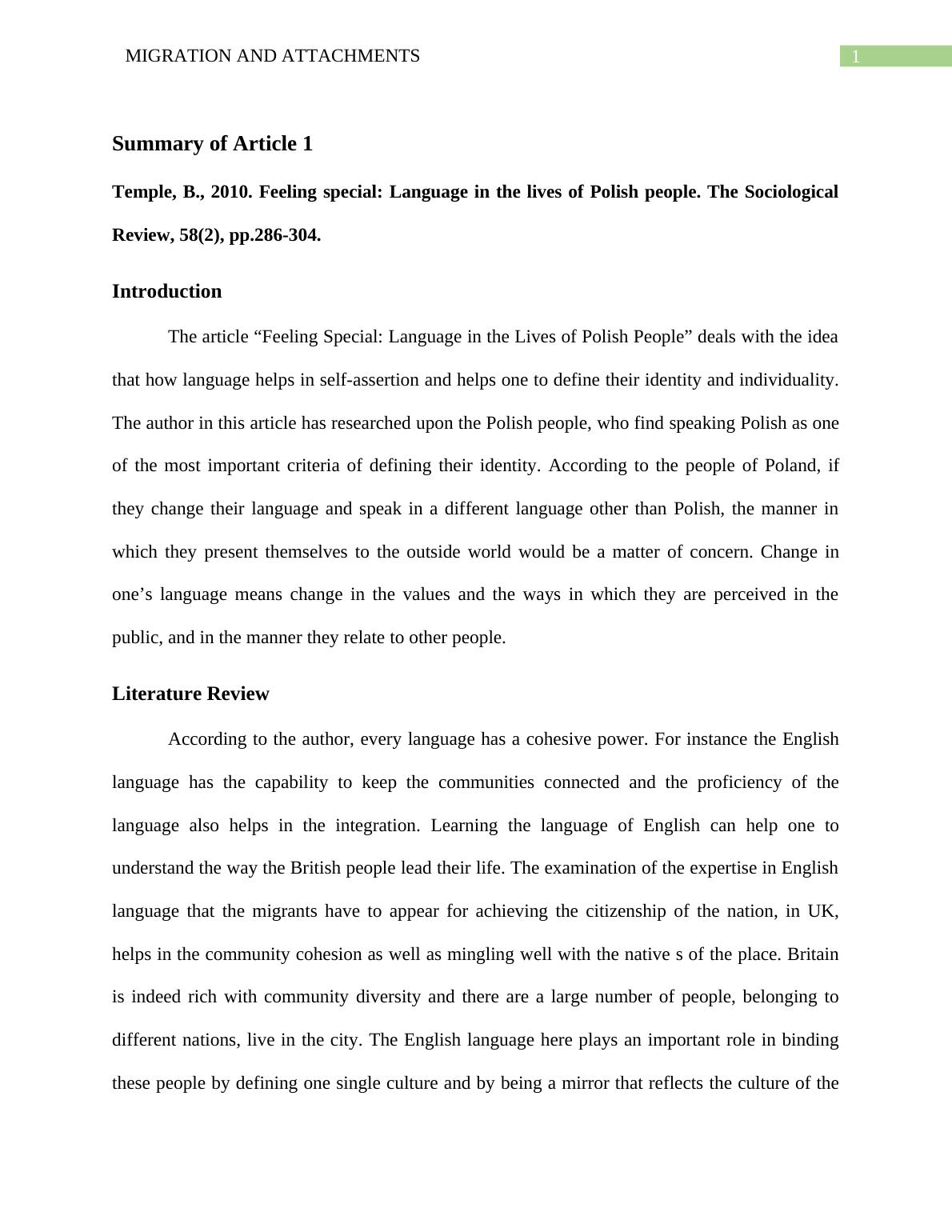
MIGRATION AND ATTACHMENTS
2
pre-existing social world. The policies of languages in the nations thus attend to the fact that the
language has a unique ability to define one’s national identity as well as it is embedded in the
contestation of the disproportionateness of the domination and power. In spite of the domination
of the first language, there are other factors such as the social and economic factors that
influence the learning of a second language. However this presence of the second language
reduces the strong hold of the homogeneity in a culturally diverse immigrant community.
To strengthen this fact, the author has incorporated his research on the Polish people as
an example. He argues taking the help of his research that there are other broader factors that
influence an individual to learn languages, such as the self-concerns as well as for identification.
The people of the Poland used to speak Polish and considered the language to be an important
part of their identity which is used to differentiate between them and the others. Through the
findings of the Polish people the author aims to widen the debate about how the English
language is influenced by the issues of self and other identification. With respect to this fact, the
author has described that there are instances where there are people who have born in the UK
and speak the English language fluently in spite of the fact that they belong to different
communities and not British. The change of the languages does not only involves the
transformation of the words but also involves a change in the original identity of the individual
which the author calls “translation of self”. Through their original language the people explain
their social, political as well as national identity.
In accordance to this, the author also gives a brief view of the different authors and
researchers, who say that the use of language of different persons is based on variety of factors
such as the linguistic competence, the age when the people have this language acquisition, along
with the context of it. One of the arguments that he brings in this case is that being able to
2
pre-existing social world. The policies of languages in the nations thus attend to the fact that the
language has a unique ability to define one’s national identity as well as it is embedded in the
contestation of the disproportionateness of the domination and power. In spite of the domination
of the first language, there are other factors such as the social and economic factors that
influence the learning of a second language. However this presence of the second language
reduces the strong hold of the homogeneity in a culturally diverse immigrant community.
To strengthen this fact, the author has incorporated his research on the Polish people as
an example. He argues taking the help of his research that there are other broader factors that
influence an individual to learn languages, such as the self-concerns as well as for identification.
The people of the Poland used to speak Polish and considered the language to be an important
part of their identity which is used to differentiate between them and the others. Through the
findings of the Polish people the author aims to widen the debate about how the English
language is influenced by the issues of self and other identification. With respect to this fact, the
author has described that there are instances where there are people who have born in the UK
and speak the English language fluently in spite of the fact that they belong to different
communities and not British. The change of the languages does not only involves the
transformation of the words but also involves a change in the original identity of the individual
which the author calls “translation of self”. Through their original language the people explain
their social, political as well as national identity.
In accordance to this, the author also gives a brief view of the different authors and
researchers, who say that the use of language of different persons is based on variety of factors
such as the linguistic competence, the age when the people have this language acquisition, along
with the context of it. One of the arguments that he brings in this case is that being able to
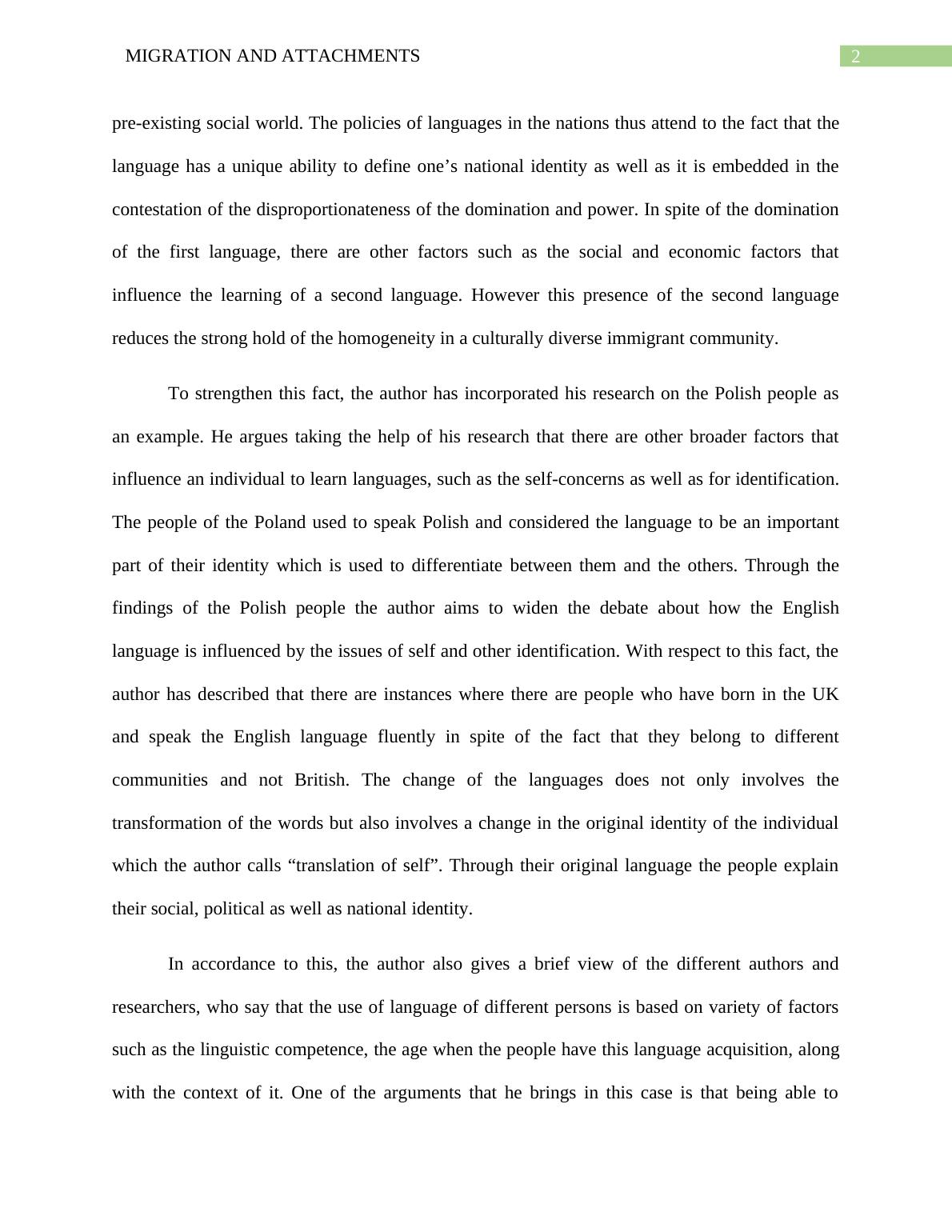
MIGRATION AND ATTACHMENTS
3
translate oneself into different languages does not essentially link oneself to the changes in the
identity directly. Instead the changes in the cultural hybridity might raise potential issues
between one’s identity and one’s mode of communication that is the language that he speaks.
Methodology
The author has supported his facts with the findings of the people of Poland. According
to them learning a different language other than Polish meant that they want themselves to adapt
the culture of the different individuals that they desire to become. Thus it involves acceptance of
the change within themselves. With this, the author has made use of the theory of identity and
narrative by different authors. The discussion of identity goes beyond being just a simple process
to the possessive property of the individuals. The author has concentrated himself with the
research that he had done with 30 people who were Polish, living in the Northwest of England
and used to speak Polish language. He had chosen 6 different participants from various
communities and backgrounds. Out of al, the participants, four people had belonged to England
since they were the refugees from the Second World War. There were two students, nine people,
who were originally from the English birth and there were 14 people who had come to seek for
professional settlement in Poland after the nation joined the EU. The participants also varied in
their gender and sex. There were 16 male and 14 female participants of the interviews. Everyone
had different levels of involvement with the Polish organizations and every one of them had
different time periods of migration, in the terms of which they defined themselves with the
culture of Poland. There had been participants who even attended the Polish Catholic Church.
These people had been interrogated by the author about their connections with the people who
spoke English and what were their individual thoughts about making a settlement with the
English community. The author had allowed them the freedom of choosing the language in
3
translate oneself into different languages does not essentially link oneself to the changes in the
identity directly. Instead the changes in the cultural hybridity might raise potential issues
between one’s identity and one’s mode of communication that is the language that he speaks.
Methodology
The author has supported his facts with the findings of the people of Poland. According
to them learning a different language other than Polish meant that they want themselves to adapt
the culture of the different individuals that they desire to become. Thus it involves acceptance of
the change within themselves. With this, the author has made use of the theory of identity and
narrative by different authors. The discussion of identity goes beyond being just a simple process
to the possessive property of the individuals. The author has concentrated himself with the
research that he had done with 30 people who were Polish, living in the Northwest of England
and used to speak Polish language. He had chosen 6 different participants from various
communities and backgrounds. Out of al, the participants, four people had belonged to England
since they were the refugees from the Second World War. There were two students, nine people,
who were originally from the English birth and there were 14 people who had come to seek for
professional settlement in Poland after the nation joined the EU. The participants also varied in
their gender and sex. There were 16 male and 14 female participants of the interviews. Everyone
had different levels of involvement with the Polish organizations and every one of them had
different time periods of migration, in the terms of which they defined themselves with the
culture of Poland. There had been participants who even attended the Polish Catholic Church.
These people had been interrogated by the author about their connections with the people who
spoke English and what were their individual thoughts about making a settlement with the
English community. The author had allowed them the freedom of choosing the language in
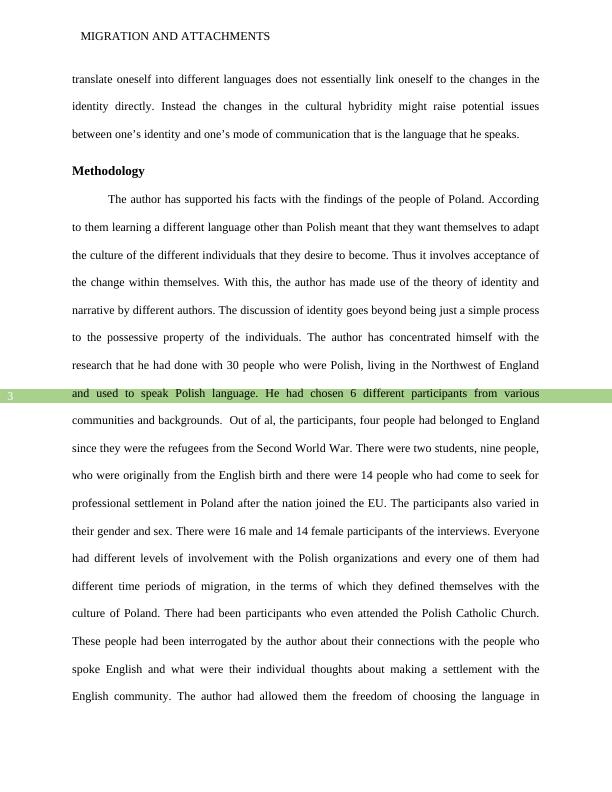
MIGRATION AND ATTACHMENTS
4
which they were comfortable of answering. The interviews had been translated to the maximum
possibility focusing on how the people spoke about their lives and their experiences. There have
been ethical considerations since the people were not comfortable with their identification to be
made public. So all the participants had been given pseudonyms to safeguard their privacy and
anonymity. The author did face problems in identifying and classifying the participants who
came from the Poland. None of the participants did work manually in Poland as well as England.
The data that the author had collected from interviewing these Polish people was aimed
to support the thesis statement of the article which included the nature of the Polish diaspora and
identity, in accordance with the role of language in the same. According to the research data,
there were seventeen people, who described themselves as Polish. These included one person
who was born in England and the twelve other people who were immigrants. The person who
was born in England considered himself to be British of Polish extraction. Here the main
problem that was prevalent was that of ethnicity. Ethnicity in the article had been described as
the belongingness of a person with respect to their historical, biological and linguistic
background. In the interviews that was conducted, it was difficult to judge the ethnicity of these
persons because there were people who claimed that they were administratively Polish, but their
emotions belonged to Europe. Thus there was the presence of duality in their nationality. The
author says that for these participants the concept and the definition of ethnicity had not been
rigid and it got changed on the basis of contexts.
All the participants did talk about the importance of the Polish language, but there was a
sharp contrast that the research found out between the Polish women and the women of English
culture. The respectable Polish women were responsible enough for their childcare and their
practical work and they did not attend the pubs like the English women. One of the participants
4
which they were comfortable of answering. The interviews had been translated to the maximum
possibility focusing on how the people spoke about their lives and their experiences. There have
been ethical considerations since the people were not comfortable with their identification to be
made public. So all the participants had been given pseudonyms to safeguard their privacy and
anonymity. The author did face problems in identifying and classifying the participants who
came from the Poland. None of the participants did work manually in Poland as well as England.
The data that the author had collected from interviewing these Polish people was aimed
to support the thesis statement of the article which included the nature of the Polish diaspora and
identity, in accordance with the role of language in the same. According to the research data,
there were seventeen people, who described themselves as Polish. These included one person
who was born in England and the twelve other people who were immigrants. The person who
was born in England considered himself to be British of Polish extraction. Here the main
problem that was prevalent was that of ethnicity. Ethnicity in the article had been described as
the belongingness of a person with respect to their historical, biological and linguistic
background. In the interviews that was conducted, it was difficult to judge the ethnicity of these
persons because there were people who claimed that they were administratively Polish, but their
emotions belonged to Europe. Thus there was the presence of duality in their nationality. The
author says that for these participants the concept and the definition of ethnicity had not been
rigid and it got changed on the basis of contexts.
All the participants did talk about the importance of the Polish language, but there was a
sharp contrast that the research found out between the Polish women and the women of English
culture. The respectable Polish women were responsible enough for their childcare and their
practical work and they did not attend the pubs like the English women. One of the participants
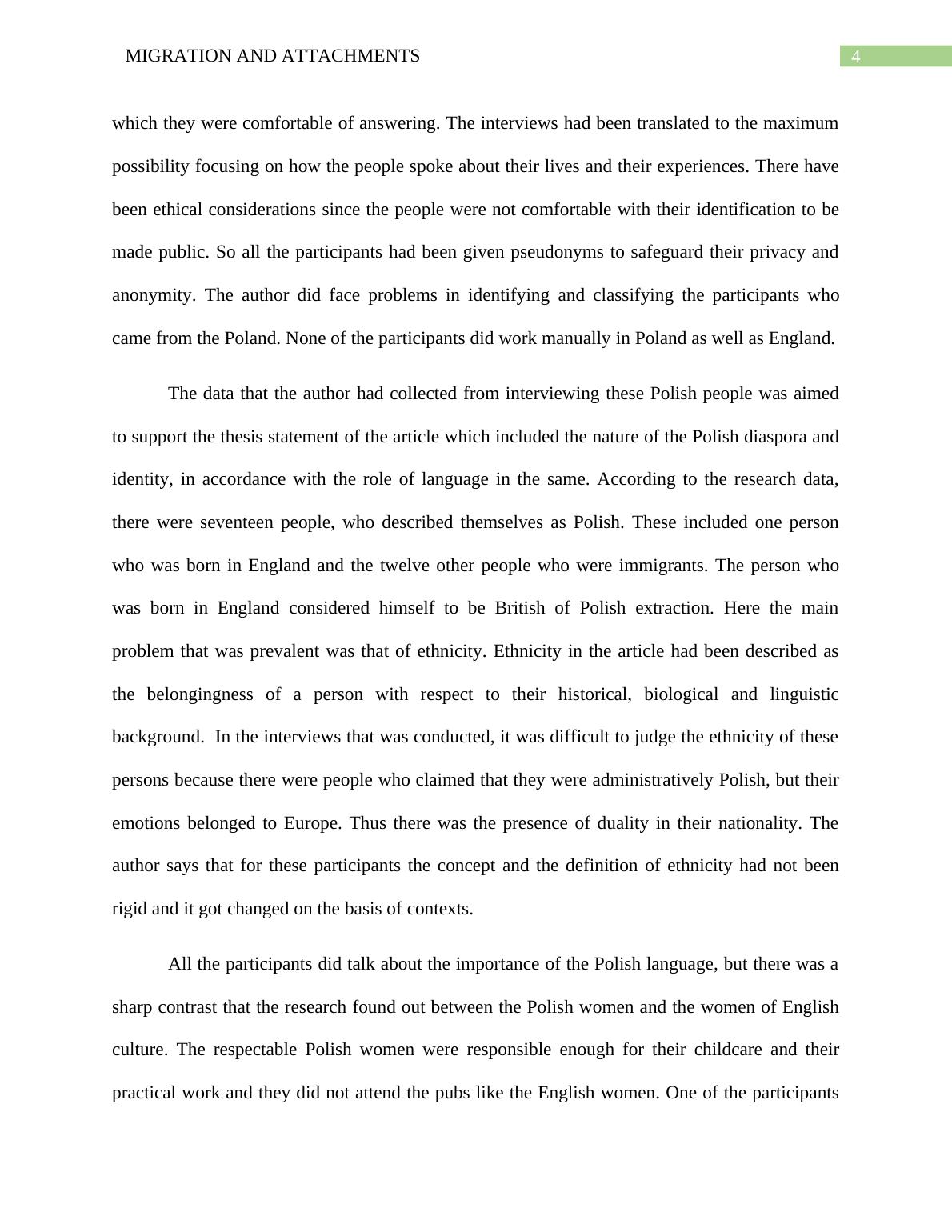
MIGRATION AND ATTACHMENTS
5
who were born in England but to Polish parents said that the Polish language was an integral part
of them since they were brought up learning the language along with the Polish cultural values.
The language had been seen as emotional repertoires to the participants. Changing the language
seemed to involve self-translation and the change reflected their different ways of relating
themselves to the two environments.
Language and culture are closely related and they are sometimes intermixed. Language is an
aspect of the one’s culture which is further related to the tradition, values and ethnicity that a
group of people identify with. This article talks about how the change in one’s language causes a
change in one’s culture and values that are held by the people.
Data Analysis
The culture or the community one belongs to becomes their identity because it includes
the values, tradition and belief system that a particular group people believe in. The participants
of the research identified and shared their views on the polish and the English values. It was
found that some of the participants were of the opinion that polish culture is better than the
English culture. However, some participants also were also of the opinion that the English
culture is far better in some ways than the polish culture. According to the article, Krzystof Biel,
an immigrant from Poland said that he could not fit into the English culture as he found it to be
all about shagging boozing, parties with wild and spoilt people doing whatever they feel like ().
Some people found the polish culture to be more disciple than the English culture. However,
some participants also said that they found the English culture to be better than that of Poland
because of the multiculturalism and the wide variety of options concerning the career choices
and freedom that it provides. the atmosphere of freedom, happiness, confidence, liberation of
England has been praised along with its anonymity and freedom from the strict ties of the church
5
who were born in England but to Polish parents said that the Polish language was an integral part
of them since they were brought up learning the language along with the Polish cultural values.
The language had been seen as emotional repertoires to the participants. Changing the language
seemed to involve self-translation and the change reflected their different ways of relating
themselves to the two environments.
Language and culture are closely related and they are sometimes intermixed. Language is an
aspect of the one’s culture which is further related to the tradition, values and ethnicity that a
group of people identify with. This article talks about how the change in one’s language causes a
change in one’s culture and values that are held by the people.
Data Analysis
The culture or the community one belongs to becomes their identity because it includes
the values, tradition and belief system that a particular group people believe in. The participants
of the research identified and shared their views on the polish and the English values. It was
found that some of the participants were of the opinion that polish culture is better than the
English culture. However, some participants also were also of the opinion that the English
culture is far better in some ways than the polish culture. According to the article, Krzystof Biel,
an immigrant from Poland said that he could not fit into the English culture as he found it to be
all about shagging boozing, parties with wild and spoilt people doing whatever they feel like ().
Some people found the polish culture to be more disciple than the English culture. However,
some participants also said that they found the English culture to be better than that of Poland
because of the multiculturalism and the wide variety of options concerning the career choices
and freedom that it provides. the atmosphere of freedom, happiness, confidence, liberation of
England has been praised along with its anonymity and freedom from the strict ties of the church
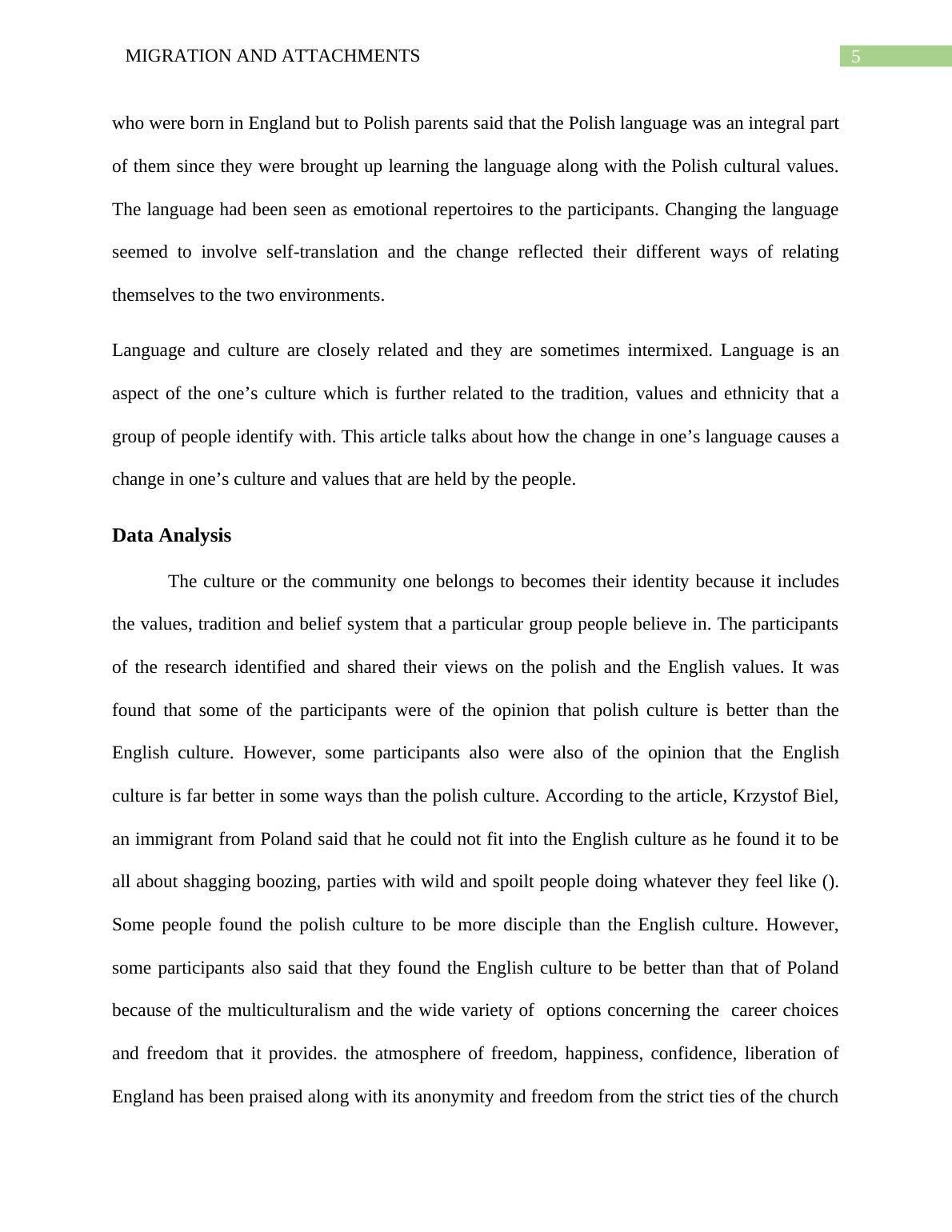
End of preview
Want to access all the pages? Upload your documents or become a member.
Related Documents
Problems based on the dominance of English Language based education during the impacts of Globalizationlg...
|4
|913
|191
Challenges Encountered by Families in Australialg...
|10
|2941
|52
Immigrants and the obstruction of languagelg...
|6
|1155
|25
Communication of Polandlg...
|4
|646
|364
Literature Review on Learning Through EALlg...
|6
|1755
|30
Linguistic colonialism of British rulelg...
|9
|2544
|22
